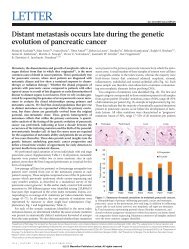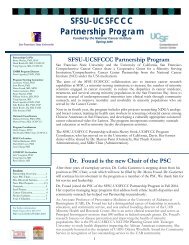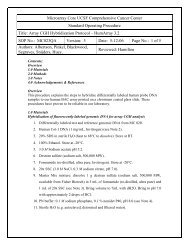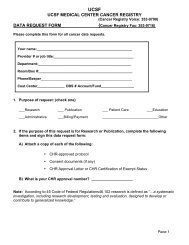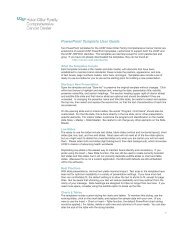ALL KITS AREN'T CREATED EQUAL! Comparing cDNA Synthesis Kits
ALL KITS AREN'T CREATED EQUAL! Comparing cDNA Synthesis Kits
ALL KITS AREN'T CREATED EQUAL! Comparing cDNA Synthesis Kits
You also want an ePaper? Increase the reach of your titles
YUMPU automatically turns print PDFs into web optimized ePapers that Google loves.
<strong>ALL</strong> <strong>KITS</strong> AREN’T AREN T <strong>CREATED</strong> <strong>EQUAL</strong>!<br />
<strong>Comparing</strong> <strong>cDNA</strong> <strong>Synthesis</strong> <strong>Kits</strong><br />
By Ryan Matson
Purpose: Why Compare?<br />
Our last evaluation was a long time ago!<br />
New kits become available<br />
– New primers, modified enzymes, buffers, etc.<br />
– Claim to be more sensitive, efficient, cheaper, etc.<br />
Old kits change<br />
– Suppliers can change ingredients<br />
– Quote expires, cost goes up<br />
Want to ensure GREAT results
Who Cares?<br />
The Genome Core Does!<br />
We do the protocol every day<br />
Work with a wide variety of samples and conditions<br />
We buy lots<br />
We want GREAT results<br />
You Do!<br />
Know what is in your kit, or at least which kit you use<br />
Consistency between projects is key<br />
You care about your results
Evaluating: What to Consider?<br />
Efficiency: Efficiency:<br />
Does the kit perform well with<br />
different RNA inputs & with different genes?<br />
Sensitivity: Sensitivity:<br />
Will the kit transcribe low copy<br />
number transcripts?<br />
Applicability: Applicability:<br />
Can the protocol be incorporated<br />
into the workflow?<br />
Cost: Cost:<br />
Can we afford it?
Evaluating: Efficiency<br />
RT Linearity - is the kit<br />
efficient with different<br />
inputs of RNA?<br />
Methods<br />
1) Serially dilute RNA<br />
2) Generate <strong>cDNA</strong> from each<br />
dilution<br />
3) qPCR on <strong>cDNA</strong>
Evaluating: Efficiency<br />
Methods cont.<br />
– 4) Graph log(CT) vs.<br />
RNA input<br />
– 5) Plug slope into<br />
efficiency equation<br />
Efficiency = 10^(-1/slope)-1<br />
Core’s Acceptable Limits:<br />
0.9 < Efficiency < 1.1
Evaluating: Sensitivity<br />
How well will the kit<br />
transcribe low copy<br />
number transcripts?<br />
Methods<br />
1) Use a standard input of<br />
RNA with all kits<br />
2) qPCR the <strong>cDNA</strong><br />
3) Look for amplification &<br />
std deviation
Evaluating: Applicability & Cost<br />
Applicability<br />
– Ease of use<br />
– Time to perform<br />
– Number of steps<br />
– Number of reagents<br />
Cost
<strong>Kits</strong> Included for Testing<br />
Applied Biosystems High Capacity <strong>cDNA</strong> Reverse<br />
Transcription Kit<br />
BioRad iScript <strong>cDNA</strong> <strong>Synthesis</strong> Kit<br />
Invitrogen Superscript III First-Strand First Strand <strong>Synthesis</strong><br />
Supermix<br />
Quanta qScript <strong>cDNA</strong> <strong>Synthesis</strong> Kit<br />
Quanta qScript <strong>cDNA</strong> Supermix<br />
Qiagen Quantitect Reverse Transcription Kit<br />
Stratagene AffinityScript QPCR <strong>cDNA</strong> <strong>Synthesis</strong> Kit
Average<br />
Results: Efficiency<br />
<strong>Kits</strong> varied in their ability to efficiently<br />
generate <strong>cDNA</strong> from different RNA inputs<br />
40<br />
35<br />
30<br />
25<br />
20<br />
15<br />
Linearity of <strong>cDNA</strong> <strong>Synthesis</strong> <strong>Kits</strong> with b-Actin<br />
-1.5 -1 -0.5 0 0.5 1 1.5 2 2.5<br />
Log of Dilution<br />
ABI<br />
Invitrogen<br />
iScript<br />
Qiagen<br />
Quanta<br />
Stratagene<br />
)Supermix (Quanta
Average<br />
Average<br />
40<br />
35<br />
30<br />
25<br />
20<br />
Results: Efficiency<br />
H.Gus<br />
15<br />
-1.5 -1 -0.5 0 0.5<br />
Log of Dilution<br />
1 1.5 2 2.5<br />
40<br />
35<br />
30<br />
25<br />
20<br />
SNAIL<br />
15<br />
-1.5 -1 -0.5 0 0.5<br />
Log of Dilution<br />
1 1.5 2 2.5<br />
ABI<br />
Invitrogen<br />
iScript<br />
Qiagen<br />
Quanta<br />
Stratagene<br />
)Supermix (Quanta<br />
ABI<br />
Invitrogen<br />
iScript<br />
Qiagen<br />
Quanta<br />
Stratagene<br />
)Supermix (Quanta<br />
Average<br />
Average Ct Val<br />
40<br />
35<br />
30<br />
25<br />
20<br />
ZEB1<br />
15<br />
-1.5 -1 -0.5 0 0.5<br />
Log of Dilution<br />
1 1.5 2 2.5<br />
24<br />
22<br />
20<br />
18<br />
16<br />
14<br />
12<br />
GapDH Sybr<br />
10<br />
-1.5 -1 -0.5 0 0.5<br />
Log of Dilution<br />
1 1.5 2 2.5<br />
ABI<br />
Invitrogen<br />
iScript<br />
Qiagen<br />
Quanta<br />
Stratagene<br />
)Supermix (Quanta<br />
ABI<br />
Invitrogen<br />
iScript<br />
Qiagen<br />
Quanta<br />
Stratagene<br />
)Supermix (Quanta
Results: Efficiency<br />
Pass/Fail Efficiencies for each Gene<br />
Gene ABI Invitrogen iScript Qiagen QuantaStratagene Supermix<br />
ACTB 0 1 0 0 1 1 1<br />
H.Gus 0 1 1 1 1 0 1<br />
ZEB1 1 1 1 1 1 0 1<br />
SNAIL 1 1 0 1 1 0 1<br />
H.GapDH Sybr 0 0 0 1 0 0 0<br />
H.Gus Sybr 0 0 1 0 1 0 0<br />
Total: 2 4 3 4 5 1 4<br />
Mean Eff:<br />
1=pass, 0=fail<br />
1.23 1.05 0.97 1.14 1.01 1.36 1.09<br />
Quanta>Qiagen,Supermix,Invitrogen>iScript>ABI>Stratagene
Results: Sensitivity<br />
(only with CDH1)<br />
Wells Showing Signal with CDH1 at 5ng/rxn<br />
Kit<br />
Wells<br />
Amplified<br />
Wells<br />
Undermined<br />
% Wells<br />
Amplified<br />
ABI 15 1 0.94<br />
Quanta 4 12 0.25<br />
Iscript 11 5 0.69<br />
Qiagen 13 3 0.81<br />
Invitrogen 11 5 0.69<br />
ABI has most wells amplified and lowest std deviation<br />
(data not shown).
Results: Applicability & Cost<br />
Factors Affecting Protocol<br />
– # reagent tubes<br />
– # of master mixes<br />
– # incubation steps<br />
– Total incubation time<br />
Result:<br />
Supermix>Quanta,iScript<br />
Supermix Quanta,iScript>Stratagene><br />
>Stratagene>Invitrogen,ABI<br />
Invitrogen,ABI>Qiagen Qiagen<br />
Cost<br />
– Not yet considered
Conclusions<br />
All kits effectively generated <strong>cDNA</strong> at the<br />
Core’s Core s standard 5ng input<br />
Quanta’s Quanta s <strong>cDNA</strong> Sythensis Kit was most<br />
efficient with our test genes<br />
Applied Biosystems kit performed best<br />
with the low copy transcript CDH1
Thanks to:<br />
The Genome Core<br />
– Randy Davis<br />
– Kirsten Copren<br />
– Jenny Dang<br />
– Langdon Smythe<br />
Markus Lacher<br />
Thanks!<br />
The Vendors<br />
– Applied Biosystems<br />
– BioRad<br />
– Invitrogen<br />
– Qiagen<br />
– Quanta<br />
– Stratagene<br />
All of our Users




